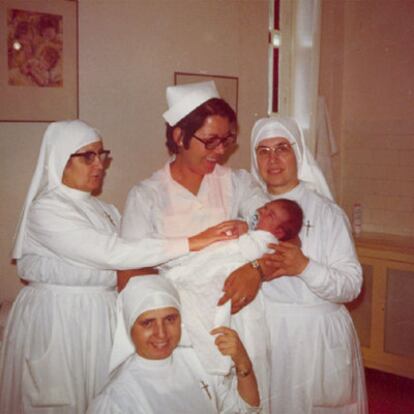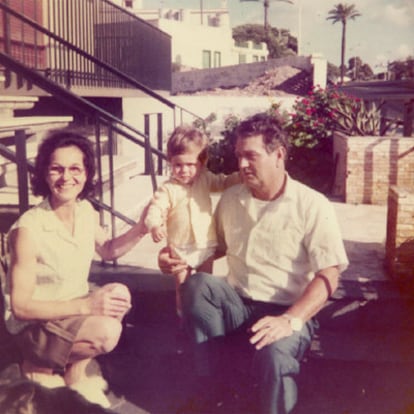How Spain's stolen children network exported babies
Nuns and doctors handed over newborns to couples from the US and Central America
A decades-long trade in babies involving hospital staff and Roman Catholic Church-run children's homes was active not only in Spain, but had an international dimension to it, further investigation by EL PAÍS can now reveal. Childless couples in the United States, as well as Central and South America, also came to Spain to circumvent adoption procedures.
Randy Ryder, who grew up in the small town of Seymore, Texas, was given to a US-Austrian couple shortly after he was born in 1971 at the San Ramón clinic in the Mediterranean port city of Málaga. He has been trying to trace his biological mother for the last decade.
"I was born on June 8, 1971, at the San Ramón de Málaga sanatorium. In 1998, my father told me that he had paid $5,000 for me, and that he had chosen 'the best-looking kid of all'," explains Ryder from his home in Austin, Texas. Ryder's birth certificate and other documents say that he was born to Randolph-Edward Ryder and Roswitha Huber. The truth is that Huber was unable to have children.
"My father said he had paid $5,000 and that he had chosen the best-looking kid"
"When she drank, she would tell me that my real mother lived in Spain"
"My adoptive mother was an alcoholic. I remember that when I was a kid, she would get depressed and start drinking. And when she was drunk she would tell me that she had been given me by a woman called Inés Holm. On other occasions, she would say that my mother lived in Spain, but that I had been born in South Africa. I never paid her much mind, because when I asked my adoptive father he would tell me not to take any notice of her, and that she went crazy when she drank. When she was sober, she would deny what she had said..."
Today Ryder says that in 1998, he visited his adoptive mother's family in Austria. "My grandmother told me that I wasn't of her blood. She told me that I was adopted. I immediately called my mother, and we talked for hours until she finally confessed that I wasn't her son. Then I called my father. They had separated 25 years earlier, and he told me that I was adopted, but that he had had little to do with the whole thing, except for the payment. He said that he had seen my real father in a bar in Málaga, that he was a foreigner who worked there."
When Ryder wrote to the Spanish Consulate in Houston in 1999, he was told the following: "According to the information in the Civil Registry, Randolph-Edward Ryder Huber has never been adopted, and his biological mother is Roswitha Huber, according to the doctor present at the birth, Manuel Muñoz Nieto."
Doctor Muñoz Nieto is still practicing in Malaga. "I had nothing to do with that woman's pregnancy. I was called to the sanatorium because her doctor was unable to attend. I went. I had no choice," he says.
"I didn't speak to her. When I arrived, she was put to sleep. If you're asking me why I put that name on the birth certificate, it's because that was the name that they gave me. I never saw a passport. She could have been a foreigner, I don't know. This all happened 40 years ago. I really can't remember much," he says. But Dr Muñoz signed the birth certificate three days after Ryder was born.
Ryder says that he will report the case to the Málaga District Attorney's Office. His adoptive parents are now dead. But Ryder says that they never wanted to talk about what really happened.
"I think it was a question of pride. We never had a good relationship," says Ryder. "After I was born they moved to Las Palmas, my father worked in the oil industry in Africa. Two years later they divorced, and I went with my mother to live in Vienna. But she drank, and so I was put into care when I was 11. They put me up for adoption again, but my father turned up and took me back to the United States."
Ryder says that the only clue he has to the identity of his biological mother is the name Inés Holm, although he admits that the name could have been invented. "I have thousands of questions: did my adoptive parents know my mother; who ended up with the $5,000... I wonder if mine is also a stolen life."


"My parents' surname is clearly Jewish"
In February 1973, a married couple resident in Central America came to Madrid to illegally adopt a baby girl. A year later they returned, and this time took a baby boy back with them. In both cases, the children were taken from the San Ramón clinic in Madrid, run at the time by Doctor Eduardo Vela Vela.
The couple's adoptive daughter prefers to keep their names, and hers, secret. She will say only that her adoptive father was from the United States, and her mother from an unnamed Central American country. They had been trying to have a child for five years, and were desperate. They had tried to adopt in Mexico without success, until a friend told them to try in Spain.
"A contact in Mexico told my parents that it was very easy to adopt in Spain, and put them in touch with a Spanish priest," says the daughter. The priest then put them in touch with Dr Vela Vela. After several telephone conversations over the course of a year, they were contacted in early 1973 and told that there would soon be a baby girl available in Madrid. It is now impossible to know if the biological mother gave her consent to the adoption: no documents pertaining to the birth exist.
All documents from the now-defunct San Ramón clinic, once the object of a police investigation, have disappeared.
The adoptive couple flew to Spain, and were duly given a baby girl on February 22, 1973. "My father, who has since died, told me that they went to the hospital and were shown a baby girl by one of the nuns; I was that child. They were told to return a few days later. My father refused and said he wanted to take me there and then. The nun asked if they wanted to see me being bathed. They were outraged when they saw the nun put me into a bowl of cold water. 'I'm not leaving without my little girl, I want her now,' my father shouted. And so they handed her over," she explains.
The clinic arranged all the paperwork: the baby was registered as the biological daughter of the Central American woman, and after applying for a passport at her embassy, the couple left with their new daughter.
Spanish adoption procedures in the 1970s were extremely complex, making the process virtually impossible for foreign couples. The simple solution in such cases was simply to register the baby as the offspring of the adoptive couple.
Having attained, or taken part in the theft of, a child, the couple decided to try their luck a second time. They contacted the same priest, and in September 1974 were again telephoned and told that another child, a boy this time, would soon be available at the San Ramón clinic. "My mother came on her own the next time, because she was in Israel when she was told about the possibility of adoption. But this time there were problems with the paperwork at her embassy," the daughter recalls. Eventually, after much wrangling, the mother was able to leave Spain on September 25, 1974. And again, Doctor Vela Vela signed a birth certificate saying that the boy was hers.
Four years after adopting the two children in Spain, the same mother became pregnant, and had a boy. "But our parents continued to bring us up as their own; we were all treated the same, and we have all been a very happy family," says the daughter.
The two adopted children were told while they were young that they were adopted. But the circumstances of their adoption were kept secret. The daughter says that she always believed that the San Ramón clinic was a kind of orphanage, where abandoned children were placed. Now that they know the truth, she says that she and her brother feel deeply hurt.
The daughter, who has been living in the United States for the last decade, always believed that she was Spanish, even though she was adopted. But a few years ago she learned the truth when she tried to enroll her own daughter in a Spanish-US private school. When she was asked to provide proof of her Spanish nationality, she discovered that she had been registered as the biological daughter of her adoptive parents. There was no trace of her biological mother on any document.
She says that she began a desperate search for any trace of her origins that might lead her to her biological mother. "I spent a lot of time looking on the internet. I think that this is quite common among adopted children: we love our adoptive parents, but we need to find our roots - to know where we have come from." She says that she would like to know the woman who brought her into this world, and believes that this would lay many ghosts to rest for both of them. "It must be terrible to be a mother and not know what happened to your baby," she says.
Perhaps the strangest thing about the story is that the arch-Catholic Dr Vela and the nuns and priests involved in the illegal adoption network would never have handed the two children over had they known that the adoptive parents were Jewish. "My parents' surname is clearly Jewish, but they can't have realized," says the daughter.
Tu suscripción se está usando en otro dispositivo
¿Quieres añadir otro usuario a tu suscripción?
Si continúas leyendo en este dispositivo, no se podrá leer en el otro.
FlechaTu suscripción se está usando en otro dispositivo y solo puedes acceder a EL PAÍS desde un dispositivo a la vez.
Si quieres compartir tu cuenta, cambia tu suscripción a la modalidad Premium, así podrás añadir otro usuario. Cada uno accederá con su propia cuenta de email, lo que os permitirá personalizar vuestra experiencia en EL PAÍS.
¿Tienes una suscripción de empresa? Accede aquí para contratar más cuentas.
En el caso de no saber quién está usando tu cuenta, te recomendamos cambiar tu contraseña aquí.
Si decides continuar compartiendo tu cuenta, este mensaje se mostrará en tu dispositivo y en el de la otra persona que está usando tu cuenta de forma indefinida, afectando a tu experiencia de lectura. Puedes consultar aquí los términos y condiciones de la suscripción digital.








































